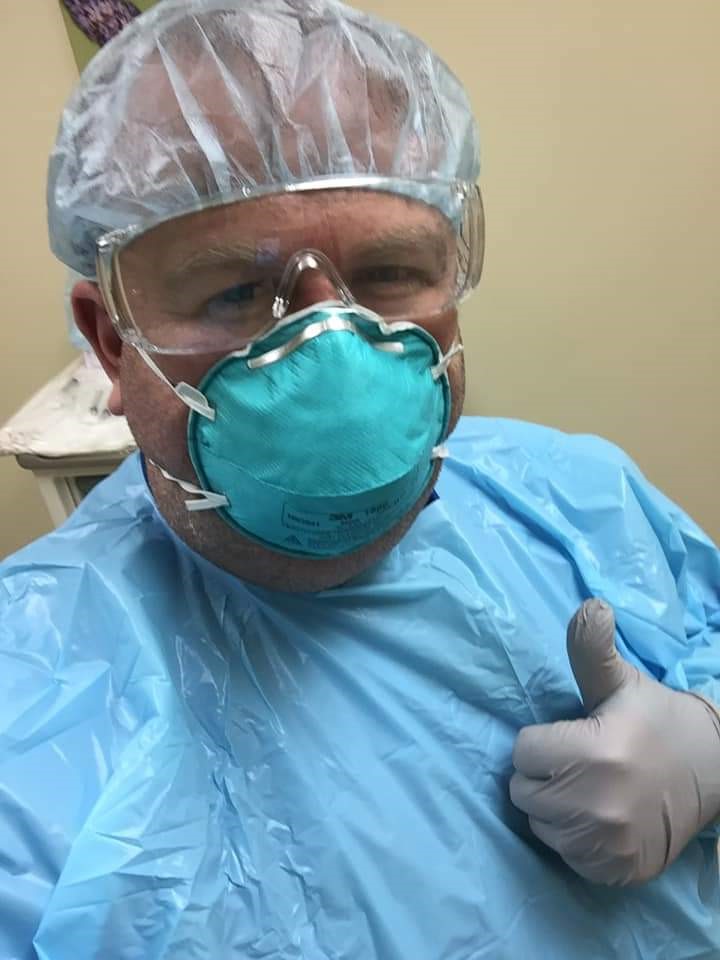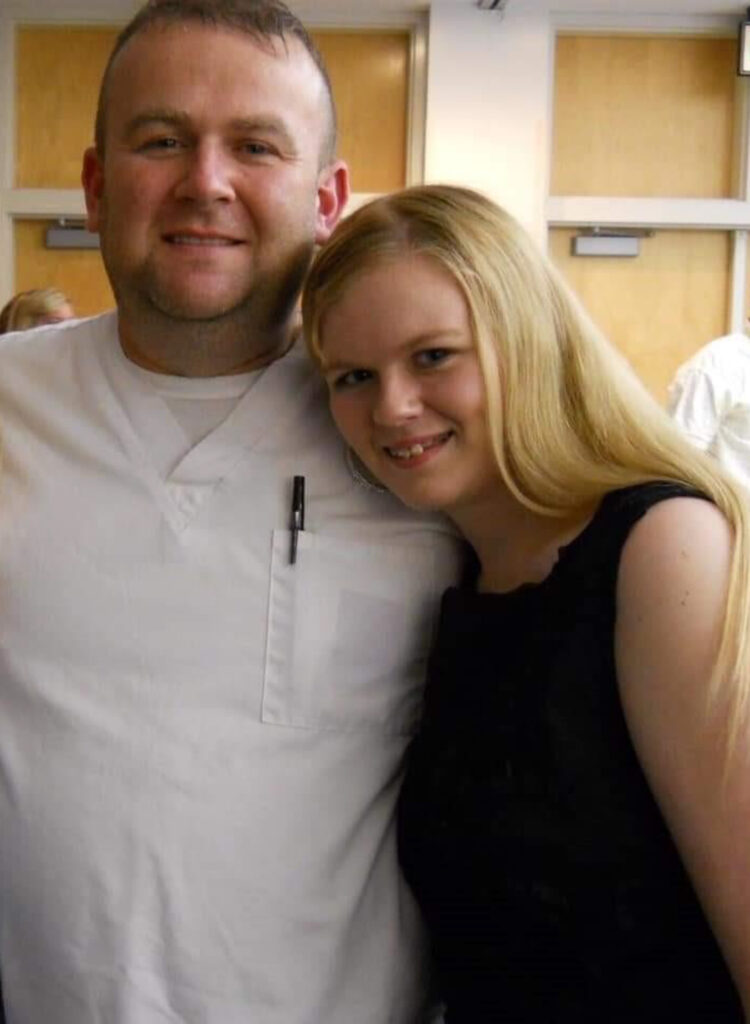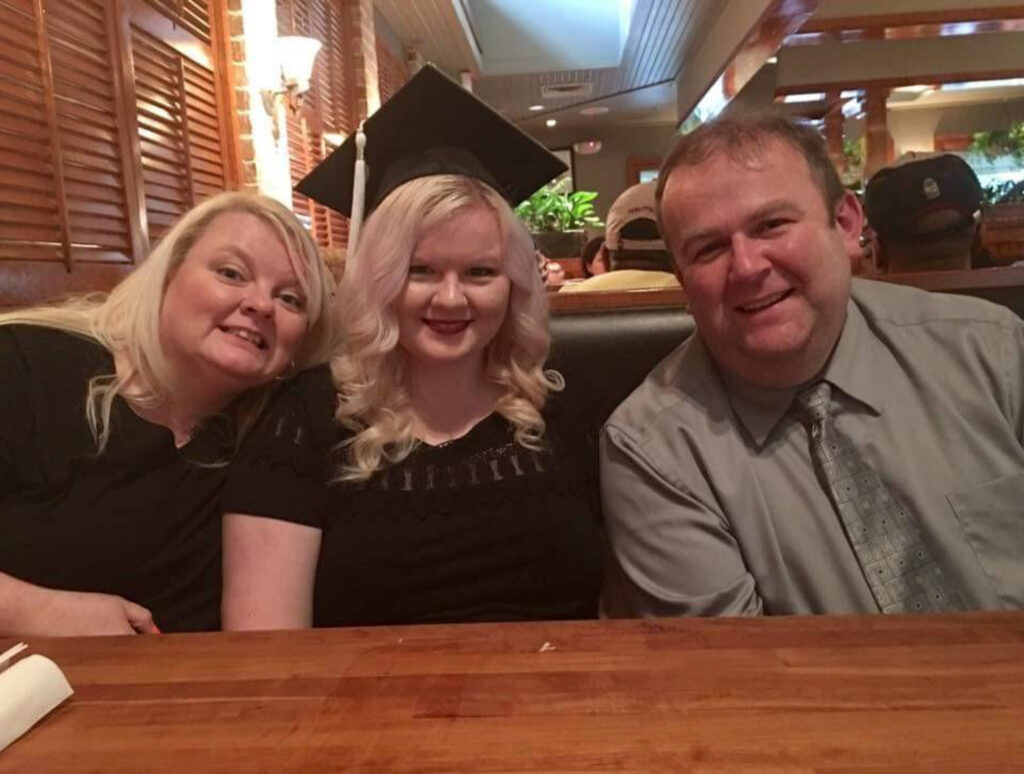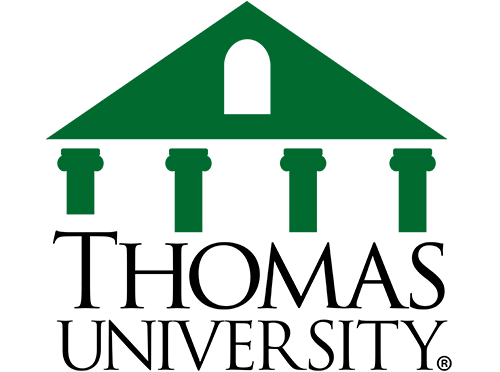Father, daughter earn master’s degrees together at TU
Post Published On:In the midst of the COVID-19 pandemic, one father-daughter duo was able to complete master’s degrees together at Thomas University, both finishing at the end of summer semester 2020. Joel Fussell earned the Master of Science in Nursing Degree while his daughter, Jennifer Fussell, earned the Master of Science in Clinical Mental Health and Clinical Rehabilitation Counseling.
In addition to working on a master’s degree, Joel is also a staff nurse at an Army military treatment facility and leading the facility’s committee responding to the COVID-19 crisis.

When Joel was a young child, his aunt graduated from college with a nursing degree. He decided that he wanted to earn that same degree just like his aunt. Over time, that plan faded. Fussell went on to spend 10 ½ years as a mechanic in the Army. During that time, he was also a combat lifesaver in his unit, which required medical training beyond basic first aid.
When Joel left the Army, he remembered his childhood dream of becoming a nurse and combined that with his experience as a combat lifesaver. He realized that he wanted to become a nurse.
“I decided after 10 ½ years as a mechanic, I wanted to do something different,” he said.
Both of Joel’s parents worked in the medical field. His father was a lab technologist. His mother was worked in medical records and later in medical coding. Joining the medical field was a natural choice.
In 2008 Joel became a licensed practical nurse and then earned as associate degree in nursing and became a registered nurse in 2010. That’s when he enrolled at Thomas University, where he earned a bachelor’s degree in nursing in 2013. This summer Fussell completed the Master of Science in Nursing Degree at TU focusing on nursing administration.
For his capstone project, Joel pulled from his work duties as a staff nurse in the emergency room at an Army military treatment facility in the Southeastern United States, where he chaired the COVID-19 response committee. Back in February when the threat of COVID-19 became a reality, Joel and his team developed protocols for operating the military treatment facility following the Centers for Disease Control guidelines. His work led to his capstone project, “Utilizing Roger’s Theory of Innovation to increase isolation bed capacity for COVID-19 patients in a military emergency department.”
“Joel was a creative and determined student,” said Dr. Kim Cribb, Chair of the Division of Health and Sciences. “When the COVID-19 pandemic threatened to delay the completion of his internship and final Master’s Capstone project, he negotiated a plan with his Army supervisors to allow him to volunteer his time to Chair the newly formed COVID-19 hospital committee. These volunteer hours allowed him to complete his internship and capstone project while simultaneously ensuring patient and staff safety and bed capacity for his unit.”
As Joel sat in the audience during the 2013 commencement ceremony, where he received his Bachelor of Science Degree in Nursing, he noticed those students graduating with their master’s degrees in nursing. He began thinking about how beneficial it would be for him to earn that master’s degree. Once Joel decided that he wanted his career to go into nursing administration, he realized that a master’s degree would help with that plan.
“You don’t necessarily have to have a degree in nursing administration to move up from where I am, but I think it will help a lot,” Joel said. “I chose Thomas for my master’s degree because I already had experience there, and I love it there. I hate large classes, and the small class size was very good for me.”
During this time, Joel’s daughter Jennifer was a student at another school, where she earned a bachelor’s degree with majors in psychology and Christianity. After graduation, Jennifer realized she wanted to pursue a master’s degree.
“I decided to pursue a master’s degree in counseling because, after dealing with my own mental health and going to therapy myself, I realized I wanted to help others who are in the same place I was in when I first started therapy,” Jennifer said. “I want to be able to help those who are struggling find peace and happiness and help them become happier, healthier people.”
As Jennifer considered different schools, her father recommended Thomas University.
“After looking at the Clinical Mental Health and Rehabilitation Counseling program, I decided that it would be a great place to continue my education and to help me pursue my desired career, Jennifer said. “It was definitely the right choice for me, and I am grateful to have been able to pursue my degree here at TU. It has been a wonderful experience.”
With both father and daughter working on graduate degrees at the same time, they created a central location for coursework.

“In our house, we converted one of our bedrooms to our school room,” Joel said. “We have two computers here. This is where me and my daughter would be sitting side by side typing away. We’d have music playing. There would be many long evenings and nights where we would just sit there, not saying a word to each other, and just working away.”
Jennifer said, “There were a lot of days, nights and weekends spent in our office together, drinking coffee, writing papers, doing research and talking about our work. There were times when we would be working on our homework, and one of us would start sharing what we were doing or we would start talking about something funny that we just read in our text. My mom likes to talk about how she would be in the living room. One of us would come out for a drink or a snack. We would say hey, talk for a bit, and then head back into our homework cave.”
Having company in the “homework cave” wasn’t the only benefit of going through graduate school together.
“It was nice to have someone from a different program be able to read through my papers and make sure there were no typos or anything that really needed fixing,” Jennifer said. “We were able to bounce ideas off each other and sometimes we would give each other advice about our projects and papers. It was a great experience.”
As a student, Jennifer excelled at TU.
“Jennifer was a quiet, hard worker who was interested in doing her best in the field and growing her clinical skills,” said Dr. Cristina Jones, Program Director for Clinical Mental Health and Clinical Rehabilitation Counseling. “She was empathic, focused, driven and goal-oriented. Following in her father’s footsteps, she has done the Thomas University academic reputation for excellence proud. We are honored she chose to pursue her graduate education with us so she could go out into her community and make a positive difference.”
Meanwhile, Joel’s classes met once a week, and the rest of the work was online. (TU’s Nursing program has since switched to a completely online format.) The class schedule was a good fit for him.
“It merged well with my work schedule and also the quality of the professors there…I couldn’t ask for any better professors than I had the entire time I’ve been working on my bachelor’s and on to my master’s,” Joel said. “They were all great. I love all of the professors there.”
While Joel and Jennifer were both working on their graduate degrees, the COVID-19 pandemic hit. For Joel, that meant coming up with a plan of action in late February 2020.
“Once COVID came out, the hospital commander had us set up a COVID committee where we met a minimum of once a week,” Joel said. “We used CDC guidelines to set up an expansion of the ER isolation area. We set up entry points around the hospital to make sure that somebody didn’t come in the hospital that had symptoms and didn’t need to be there. We collaborated with the community to bounce different ideas off personnel from the local hospital there.”
Joel was able to use his experience dealing with the threat of COVID-19 at the military treatment facility for his capstone project.
“After speaking with Dr. Cribb, it just flowed so easily,” Joel said. “It met the course requirements, and it got me a lot of experience in nursing administration that I normally wouldn’t have had…I tell people all the time that COVID was a blessing in disguise for me because it allowed me to do this project, which came at the right time for the right purpose for me. It was so easy to slide this – what I was already doing for the hospital – into a capstone project.”
Joel considers the project and his hospital’s response to the pandemic both successful.
“I think we had a successful program.” During that time, no one in the ER, no doctors or nurses had gotten sick from COVID. I think that’s a testament to the people actually following our advice and the protocols we set up and keeping safe, and washing hands, and wearing the gear, and doing what they’re supposed to do…We’re still keeping the policy in place and will up until they say there’s no more pandemic.”
Dealing with a crisis situation at work and a capstone project for a graduate degree was no easy task.
“I think I have a little special place in my heart for Dr. [Eleanor] Hall and Dr. [Kim] Cribb because they helped me through this capstone,” Joel said. “It was a challenging course, but it was also very rewarding. It made me feel like I got some real-world experience.”
Joel considers that experience extremely helpful.
“I know I’m going to be prepared for when I do get my next promotion and when I’m in charge of a larger group of people,” he said. “I really do understand how things work from having gone from the classes on leadership and theories and going into the practicum and see how all this merges. It integrates every single class we took. It integrated all that stuff, and now I understand why we were taking what we took.”
Meanwhile, Jennifer is working as a clinical associate at Darsey, Black & Associates, Clinical Mental Health Services in Hinesville, Georgia. She’s also working on obtaining her Associate Professional Counseling license. Then she’ll focus on becoming a Licensed Professional Counselor.
“I really want to work with children,” she said. “It’s something I really enjoy and am motivated to do. I am thinking about getting certified as a play therapist to be able to provide more services to the community and surrounding counties as well as to be able to work with more children and help them in more ways. Because of where I work and the community in which I live, I am able to work with those who are in the military as well as civilians, which is a wonderful opportunity. I would like to work with children in the military, but after working with DBA, I also want to continue working with DFCS (Department of Family and Children’s Services) clients. Both military and DFCS clients are underserved populations, and I want to continue to help provide services for them.”
Now that Joel and Jennifer finished their master’s degrees, that won’t be the end of higher education for the Fussell family. Laura, Joel’s wife and Jennifer’s mother, just started working on a college degree.


